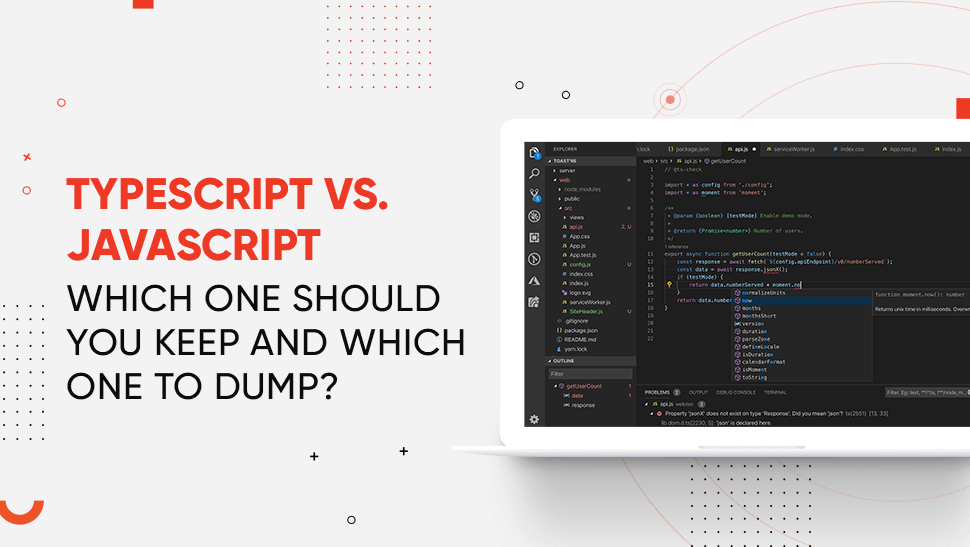TypeScript is basically JavaScript with some added features. Both languages are used today. However, TypeScript’s features, functionality, and relatively easier coding make it more viable and reliable for developers.
In contrast, JavaScript was initially developed as a client-side programming language.
However, the increase in the usage of JavaScript enabled programmers to realize that the language could also be used as a server-side programming language.
Growing usage of JavaScript made its code complex and heavy, which is why it wasn’t able to fulfill the requirement of an Object-Oriented programming language and prevented it from becoming an enterprise-level server-side technology.
And here’s how TypeScript came into being.
The primary differences between TypeScript and JavaScript are the following:
- TypeScript supports interfaces, whereas JavaScript doesn’t.
- TypeScript offers full module support – a functionality that is not present in JavaScript.
- TypeScript has a feature called ‘Static.’ However, JavaScript doesn’t support this feature.
- TypeScript is an Object-oriented programming language. In contrast, JavaScript is a scripting language.
- TypeScript has operational parameter function compatibility, whereas JavaScript does not.
- TypeScript’s code is more reliable and easier to refactor as compared to JavaScript.
After addressing the primary differences, let’s dive into some other details of both, TypeScript and JavaScript to further explore.

What is TypeScript?
TypeScript can be considered as a more modern form of JavaScript. The language is statistically compiled to write clear and simple code. TypeScript can be compiled to JavaScript easily without any issues, as TypeScript is like a superset to JavaScript.

What is JavaScript?
The reason behind web pages becoming interactive was mainly due to the emergence of JavaScript. It doesn’t need any resources from the server-side. Javascript runs on your browser, and changes can be made to it in real-time. It can be used with other technologies like REST, XML, and more. Javascript files are identified with the .js extension.
Features of TypeScript
- TypeScript code is converted into understandable JavaScript code: Browsers can’t understand a word of the TypeScript code, so the code written is compiled and then switched to the JavaScript code so that browsers can interpret it easily. This above process is called Trans-Piled.
- JavaScript is TypeScript: Converting the code from JavaScript to TypeScript is very easy; by changing the extension from .js to .ts, a JavaScript code is converted to a TypeScript code.
- TypeScript can be used anywhere: Any browser, device, or operating system can run the TypeScript code smoothly. The code is not specific to any virtual engine or operating system.
- Library support: TypeScript supports the JS library so the developers can easily use JavaScript libraries and can also call from other JavaScript libraries.

Features of JavaScript
- Server communication: Before the page gets sent off to the server-side, it gives the option for validation of user input.
- Interaction: User experiences can be made more pleasurable by creating an interface where the button produces a reaction as soon as it hovers its mouse over it.
- Faster loading speeds: In JavaScript, the changes can be made in real-time. So the developers don’t have to wait and reload the pages to see the changes that are made by them.
- User greetings: Javascript has a feature that depending on the time and the appropriate date, greets the user.

More Difference between TypeScript and JavaScript
| TypeScript | JavaScript | |
| Type | Object-oriented powerful compile language | Interpreted programming language of high level |
| Developed by | Andres Hejlsberg at Microsoft | Brenden Eich at Netscape Corporation |
| Light/Heavyweight | It is a lightweight interpreted coding language | Heavyweight and designed to develop complex applications |
| Server/Client-side | Built mostly for client-side use | Can be used both sides |
| File extension | .ts, .tsx | .js |
| Annotations | Must be annotated constantly | Not required |
| Static Typing | Supports static typing | No static typing is supported in Javascript |
| Modules | Supports modules | Does not support modules |
| Interface | Has an interface | Does not have an interface |
| Compilation | TypeScript need a compiler to compile its code | Javascript doesn’t need compilation |
| Community of developers | TypeScript is relatively new, so it has a smaller base of community | Javascript is used widely and therefore has a huge number of developers in the community |
| Companies using | Clever, Asana, Screen award | Airbnb. Instagram, Codecademy |

History of TypeScript
Created by Microsoft TypeScript is an open-source programming language with optional static typing. TypeScript is a superset to Javascript, and it can be used for both client-side and server-side development.
Let’s see some of the few landmarks of TypeScript:
- In October 2012 TypeScript was released with version 0.8, later on, October 2013 version 0.9 was released
- Then in 2014 Microsoft added support for generics and released TypeScript version 1.0
- The TypeScript developer team at Microsoft then developed TypeScript compiler in July 2014 which promised five times more performance
- Microsoft later released TypeScript 2.0 in September 2016 that included new features like optionally preventing variables from entering null values.
- Conditional types were added in March 2018
History of JavaScript
Javascript was created by Brenden Eich, who was a programmer at Netscape Communications Corporation. Initially, it was designed to work as a Netscape navigator, but after becoming popular as a scripting tool, it became LiveScript.
Later on, to reflect the support of Java in its web browsers, it was renamed JavaScript.
Let’s see some of the essential landmarks in Javascript history:
- Netscape officially submitted Javascript to ECMA (European computer manufacturers association) in November 1996
- In 1998 ECMAScript 2 was released
- In 1999 ECMAScript 3 was released
- Mozilla and Eich joined ECMA to develop EX4 in 2005
- To define a shared standard library CommonJS project was launched in January 2009
- ECMAScript 5.1 was released in June 2011
- ECMAScript 2016 was released in June 2015
- In June 2017 the current version ECMAScript 2017 was launched

When To Choose TypeScript And Javascript?

TypeScript
Prefer compile-time type checking: Using vanilla TypeScript, it is entirely possible to perform runtime type verification. Keep in mind that this also adds extra runtime, which you can avoid using compile-time validation.
Working with a new library or Framework: If you are taking up a new project that uses React and are not familiar with its API’s, then you need to know that they offer type definitions. You can use IntelliSense to help you navigate through and discover new interfaces.
Large projects or multiple developers: If you have a large project that you are working on or have various developers working together, then TypeScript is the best choice. The interface of TypeScript and access modifiers can be a bonus in communicating APIs.
JavaScript
Build tools required: To produce the final Javascript, TypeScript requires an additional step to be executed. Therefore it is popular today to use JavaScript without the help of any build tools.
Small Projects: Javascript can be a perfect solution for small projects or small teams.
Steady testing workflow: Having a team already implementing test-driven development is better than switching to TypeScript even with all its associated costs and features.
Added dependencies: You need type definitions of the libraries which you want to use in TypeScript. An added type definition results in an extra epm package. There is a risk involved by using this extra type definition that they may go unmaintained or they might be an incorrect option. Also, not using the type definitions in TS is a loss as it is the best feature of TypeScript. Therefore, choose a popular library for your project as there are chances that it will be appropriately maintained in foreseeable future.
Unsupported Framework: Some frameworks do not support TS. TS does not support frameworks such as EmberJS, so you may not be able to take advantage of its features.

What Is The Advantage Of TypeScript Over JavaScript?
At the time of development, only TypeScript will point out the compilation errors. Therefore, there are very few chances of getting any errors at the runtime, whereas, in Javascript, there is no feature like this.
TypeScript has a feature called “strongly typed or supports static typing”. This means that at type compilations, static typing allows for checking type correctness. This feature is not available in JavaScript.
TS is similar to JavaScript but with additional features such as ES6. It may be possible that it is not supported in your target browser, but TS can compile the .ts file into ES3 till ES5.
There are many web development tools available out there that can be used along with these two languages to boost your productivity.

Which One Is Better?
As we mentioned multiple times in the post, TypeScript is the superset of Javascript, so all the features that Javascript has TypeScript also have them with some additional features. It compiles to Javascript only, so it is advantageous to use TypeScript. Currently, JavaScript is used widely and is very popular, but because of its features over JavaScript, the popularity of
TypeScript is also increasing drastically. Although at its core, TypeScript is JavaScript so there is no way it can replace JavaScript; but it’s possible that it may change the way people write code for web development.

Other Options
We saw the two popular options currently used widely for web development, but are these the only two to choose from? The answer is no. There are two more types of development tools worth paying attention to
- Facebook flow
- Google Closure
Both are good options to choose from. Closure mainly compiles the significant and lengthy JavaScript code into compact code so that it can be easily downloaded and run quickly wherever you need to.

Conclusion
In the end, it can be said that Javascript and TypeScript both have their downfalls and benefits. Javascript is not a full-fledged coding language; it is used alongside HTML to improve web pages’ quality. But javascript does come inside the context of a developer’s browser.
On the other hand, TypeScript compiles into JS code, which can be used wherever JS is applicable. Still, TypeScript comes with additional features, so it is gaining popularity and used by a wider audience. It is also receiving new features and improvements constantly, therefore, making it a safer bet for future use as well.

 2712 Views
2712 Views March 3, 2022
March 3, 2022









